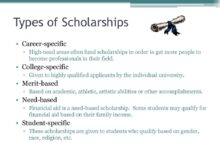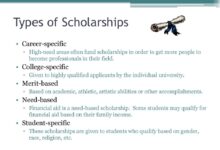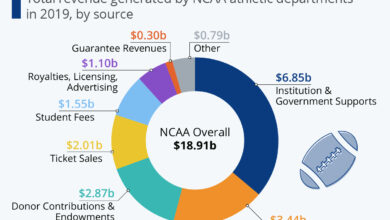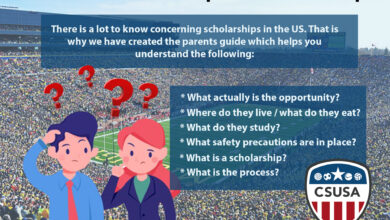How To Win A Full Ride Scholarship To College: A Comprehensive Guide
How to Win a Full Ride Scholarship to College sets the stage for an exciting journey towards securing a fully-funded education. Dive into the strategies and insights to make your scholarship dreams a reality.
Researching Scholarships
When it comes to securing a full ride scholarship to college, thorough research is key. It’s essential to explore various scholarship opportunities to increase your chances of finding the right fit for you.
Identifying Scholarship Sources
There are several sources where students can search for scholarships:
- College websites: Many colleges offer full ride scholarships to attract top-tier students.
- Online scholarship databases: Websites like Fastweb, Scholarships.com, and College Board’s Scholarship Search provide a vast array of scholarship opportunities.
- Local organizations: Check with community groups, businesses, and foundations in your area for scholarship options.
- Professional organizations: Associations related to your field of study often offer scholarships to students pursuing careers in that industry.
Evaluating Scholarship Opportunities
When assessing scholarship opportunities, consider the following criteria:
- Eligibility requirements: Make sure you meet all the qualifications before applying.
- Application deadlines: Stay organized and submit your applications on time to avoid missing out on opportunities.
- Essay or interview components: Prepare compelling essays and practice for interviews to make a strong impression.
- Renewability: Some scholarships are renewable, so be aware of any conditions you need to meet to maintain the award.
- Competition level: Understand how many applicants typically apply for the scholarship to gauge your chances of success.
Perfecting Your Application
When applying for a scholarship, it is crucial to ensure that your application stands out among the competition. Here are some essential components and tips to help you perfect your scholarship application.
Essential Components of a Scholarship Application
- Personal Statement: Craft a compelling personal statement that highlights your achievements, goals, and aspirations.
- Letters of Recommendation: Obtain strong letters of recommendation from teachers, mentors, or employers who can speak to your qualifications.
- Academic Transcripts: Submit your academic transcripts to demonstrate your academic performance.
- Resume: Create a detailed resume that showcases your extracurricular activities, volunteer work, and leadership roles.
- Essay Responses: Write thoughtful and well-crafted essays that address the scholarship prompts effectively.
Tailoring Your Application to Specific Scholarship Requirements
- Research the Scholarship: Understand the mission and values of the scholarship provider to tailor your application accordingly.
- Customize Your Essays: Adapt your essay responses to align with the specific goals and criteria of each scholarship.
- Showcase Relevant Experience: Highlight experiences and achievements that directly relate to the scholarship requirements.
- Emphasize Your Unique Qualities: Clearly communicate what sets you apart from other applicants and why you deserve the scholarship.
Successful Application Strategies
- Start Early: Begin the application process well in advance to allow ample time for revisions and edits.
- Proofread Carefully: Thoroughly proofread your application to ensure it is free of errors and presents your best self.
- Seek Feedback: Obtain feedback from teachers, counselors, or mentors to improve the quality of your application.
- Follow Instructions: Adhere to all instructions provided by the scholarship committee to demonstrate your attention to detail.
Highlighting Achievements and Community Involvement
When applying for a full ride scholarship to college, it is crucial to showcase not only your academic achievements but also your involvement in extracurricular activities and community service. These aspects can significantly enhance your scholarship application and set you apart from other candidates.
Significance of Showcasing Academic Achievements and Extracurricular Activities
Academic achievements demonstrate your dedication to your studies and your ability to excel in a competitive academic environment. Highlighting your high grades, test scores, and any academic awards can show scholarship committees that you are a motivated and capable student.
Extracurricular activities, such as participation in sports, clubs, or volunteer work, can demonstrate your leadership skills, time management abilities, and commitment to personal growth. These activities can also showcase a well-rounded personality and a willingness to go above and beyond in your pursuits.
Community Service and Leadership Roles Enhancing a Scholarship Application
Engaging in community service demonstrates your commitment to making a positive impact on the world around you. Scholarship committees value students who are actively involved in giving back to their communities and showing compassion for others. Holding leadership roles in community service projects or extracurricular activities can further highlight your ability to take initiative and inspire others.
Effectively Communicating Accomplishments
When highlighting your achievements and community involvement in your scholarship application, be sure to provide specific examples and quantify your impact whenever possible. Use action verbs and concise language to clearly communicate what you have accomplished and how it has shaped your character and goals. Tailor your descriptions to align with the values and goals of the scholarship organization to make a strong impression.
Crafting a Stellar Essay
When applying for a scholarship, your essay can be the key to standing out among other applicants. A well-written essay not only showcases your writing skills but also allows the scholarship committee to get to know you on a more personal level.
The Importance of a Well-Written Scholarship Essay
Your scholarship essay is your opportunity to share your unique story, experiences, and aspirations with the selection committee. It allows you to highlight your strengths, achievements, and goals in a way that sets you apart from other applicants.
- Be authentic and genuine in your writing to connect with the readers on a deeper level.
- Showcase your passion, drive, and dedication to your academic and personal pursuits.
- Demonstrate your critical thinking skills and ability to articulate your thoughts effectively.
Choosing a Compelling Essay Topic
When selecting a topic for your scholarship essay, it’s essential to choose something that not only reflects who you are but also captivates the reader’s attention. Consider the following tips:
- Focus on a significant event or experience that has shaped your life or influenced your goals.
- Highlight a challenge you have overcome and how it has impacted your personal growth.
- Discuss a topic you are passionate about or a cause you strongly believe in.
Structuring and Formatting Your Scholarship Essay
Organizing your essay in a clear and coherent manner is crucial to ensuring that your message is effectively communicated. Follow these guidelines to structure and format your scholarship essay:
- Start with a compelling introduction that grabs the reader’s attention and sets the tone for the rest of the essay.
- Develop your main points in the body paragraphs, providing examples and evidence to support your claims.
- Conclude your essay with a strong closing that reinforces your main ideas and leaves a lasting impression on the reader.
Securing Strong Letters of Recommendation
Securing strong letters of recommendation can significantly enhance your scholarship application and set you apart from other candidates. These letters provide insight into your character, academic abilities, and potential for success, giving the scholarship committee a well-rounded view of who you are as a student and individual.
Key Elements of a Strong Letter of Recommendation
- Personalized insights into your character and strengths
- Specific examples of your accomplishments and contributions
- Relevance to the scholarship criteria
- Contact information and credentials of the recommender
Approaching Potential Recommenders and Requesting Letters
When approaching potential recommenders, choose individuals who know you well and can speak to your abilities and accomplishments. It’s essential to make a formal request, providing details about the scholarship and why you believe their recommendation would be valuable.
Following Up with Recommenders
After requesting a letter of recommendation, it’s crucial to follow up with your recommenders to ensure timely submission. Sending a polite reminder closer to the deadline and expressing gratitude for their support can help keep the process on track.
Providing Relevant Information to Recommenders
- Share your academic achievements, extracurricular activities, and community involvement
- Provide a copy of your resume or personal statement to give insight into your background and goals
- Include specific details about the scholarship requirements to tailor the recommendation
Aceing Standardized Tests
Standardized test scores play a crucial role in scholarship applications, as they provide an objective measure of a student’s academic abilities. Here are some strategies to help you prepare and excel in standardized tests:
Strategies for Test Preparation
- Create a study schedule: Allocate specific time slots each day to review different subjects and practice test questions.
- Take practice tests: Familiarize yourself with the format and types of questions that may appear on the actual exam.
- Utilize resources: Use online practice materials, study guides, and tutoring services to enhance your preparation.
- Focus on weaknesses: Identify your weak areas and dedicate more time to improving those skills.
Types of Questions and Time Management
- Common types of questions include multiple-choice, fill-in-the-blank, and essay prompts.
- Time management is crucial during standardized tests to ensure you complete all sections within the allotted time.
- Practice pacing yourself by timing practice tests and working on strategies to answer questions efficiently.
Test Anxiety and Focus
- To overcome test anxiety, practice relaxation techniques such as deep breathing or visualization before the exam.
- Stay focused during the test by maintaining a positive mindset, reading questions carefully, and managing your time effectively.
Scoring Systems and Test Differences
- The SAT and ACT tests have different formats and scoring systems, with the SAT focusing more on reasoning and critical thinking skills, while the ACT covers a broader range of subjects.
- Understand the scoring criteria for each test to tailor your preparation accordingly.
Navigating the Interview Process
Interviews are a crucial part of the scholarship application process as they allow selection committees to get to know the candidates beyond their written applications. It is an opportunity for applicants to showcase their personality, communication skills, and passion for their field of study. Therefore, being well-prepared for a scholarship interview can significantly increase your chances of securing the scholarship.
Importance of Scholarship Interviews
Scholarship interviews provide a platform for applicants to stand out from the competition by demonstrating their unique qualities and experiences. It allows the selection committee to assess the candidate’s suitability for the scholarship and their potential for success in their academic and professional pursuits.
- Highlight your achievements and aspirations.
- Express gratitude and enthusiasm for the opportunity.
- Showcase your personality and passion for your chosen field.
- Demonstrate good communication skills and professionalism.
Tips for Preparing for Scholarship Interviews
Preparing for a scholarship interview involves researching the scholarship organization, practicing common interview questions, and reflecting on your goals and experiences. Here are some tips to help you prepare:
- Research the scholarship organization and its values.
- Practice answering common interview questions.
- Prepare anecdotes or examples to support your answers.
- Dress professionally and arrive early for the interview.
Common Interview Questions and Effective Responses
During scholarship interviews, you may encounter questions that aim to assess your character, goals, and suitability for the scholarship. Here are some common interview questions and effective responses:
“Tell us about yourself and why you are interested in this scholarship.”
Response: “I am a dedicated student passionate about [your field of study]. This scholarship aligns with my goals of [specific goal] and [specific goal], and I believe it will provide me with the necessary resources to achieve them.”
“What sets you apart from other candidates applying for this scholarship?”
Response: “I believe my unique combination of [specific skill or experience] and [specific skill or experience] sets me apart. These qualities have helped me [specific achievement] and prepared me to succeed in [your field of study].”
Understanding Financial Aid Options
Financial aid plays a crucial role in making college education accessible to students from various backgrounds. Understanding the different types of financial aid options available can help students navigate the complex process of funding their education.
Types of Financial Aid
- Grants: These are funds that do not need to be repaid and are usually based on financial need.
- Loans: These are borrowed funds that need to be repaid with interest after graduation.
- Work-Study Programs: These provide part-time employment opportunities for students to earn money while studying.
Scholarships and Financial Aid
- Merit-Based Scholarships: Awarded based on academic, athletic, artistic, or other achievements.
- Need-Based Scholarships: Awarded to students based on financial need.
- Athletic Scholarships: Offered to students with exceptional sports abilities.
Remember, scholarships are a form of gift aid and do not need to be repaid, making them an excellent way to reduce the financial burden of college.
Maximizing Financial Aid Opportunities
Completing the FAFSA accurately and on time is crucial for accessing federal financial aid programs. Additionally, researching and applying for external scholarships can help supplement existing financial aid packages and reduce reliance on loans.
Budgeting and Financial Management
- Creating a budget and tracking expenses can help students manage their finances effectively.
- Consider part-time work or paid internships to cover additional expenses.
- Seek financial literacy resources and workshops offered by the college to enhance money management skills.
Leveraging Technology in Scholarship Search
Utilizing technology tools is crucial in enhancing the scholarship search process for students. With the vast amount of information available online, students can leverage various websites and apps to find relevant scholarships quickly and efficiently.
Websites and Apps for Scholarship Search
- One example of a popular scholarship search platform is Fastweb, which allows students to create profiles and receive personalized scholarship matches.
- Another useful website is Scholarships.com, where students can search for scholarships based on different criteria such as academic achievements or interests.
- Apps like Scholly and Going Merry also provide students with easy access to a database of scholarships that they may be eligible for.
Setting up Alerts and Notifications
- By setting up alerts or notifications on scholarship search platforms, students can stay updated on new opportunities that match their profile and preferences.
- Receiving real-time notifications can help students act promptly and increase their chances of applying for relevant scholarships before the deadlines.
Creating a Strong Online Presence
- Optimizing social media profiles can attract scholarship providers who may be looking for students with specific skills or interests.
- Sharing achievements, community involvement, and goals on platforms like LinkedIn can showcase a student’s qualifications and dedication to potential scholarship sponsors.
Data Analytics and AI Algorithms
- Some scholarship search platforms use data analytics and AI algorithms to match students with potential scholarship options based on their profiles and preferences.
- These advanced technologies can help students discover scholarships that align with their academic and personal backgrounds, saving time and effort in the search process.
Networking with Professionals Online
- Engaging with professionals in the field through online platforms like LinkedIn can help students discover hidden scholarship opportunities that are not widely advertised.
- Building a strong network online can lead to valuable connections with individuals who can offer guidance, mentorship, or information about exclusive scholarship programs.
Exploring Specialized Scholarships
When it comes to winning scholarships for college, exploring specialized scholarships tailored to your field of study or interests can significantly increase your chances of success. These scholarships are often overlooked by students but can provide unique opportunities for financial support and personal growth.
Niche Scholarship Opportunities
Many students are unaware of the niche scholarship opportunities available in specific academic disciplines or areas of interest. These specialized scholarships cater to individuals with particular skills, backgrounds, or career goals, offering a tailored approach to support their education.
- Example 1: The Women in Engineering Scholarship requires applicants to be female students pursuing a degree in engineering with a minimum GPA of 3.0.
- Example 2: The LGBTQ+ Leadership Award is open to students who have demonstrated a commitment to LGBTQ+ advocacy and community involvement.
Researching Specialized Scholarships
When researching specialized scholarships, it is essential to explore resources specific to your academic discipline or extracurricular activities. Utilize online databases, university websites, and professional organizations to identify scholarship opportunities that align with your interests and goals.
Benefits of Specialized Scholarships
Applying for specialized scholarships goes beyond financial aid, offering networking opportunities, mentorship programs, and recognition within your field of study or community. These scholarships can connect you with industry professionals and like-minded peers, enhancing your academic and professional development.
Specialized Scholarships Comparison Table
| Scholarship Name | Eligibility Criteria | Deadlines | Award Amount |
|---|---|---|---|
| Women in STEM Scholarship | Female students pursuing a STEM degree with a GPA of 3.5 or higher | April 30th | $5,000 |
| Minority Business Leaders Scholarship | Underrepresented minority students majoring in business-related fields | July 15th | $2,500 |
Seeking Mentorship and Guidance
Seeking mentorship and guidance on your scholarship journey can significantly increase your chances of success. Mentors, counselors, or scholarship experts can provide valuable insights, advice, and support to help you navigate the competitive scholarship landscape.
Building Relationships with Mentors
Building relationships with mentors who have experience in the scholarship application process can be instrumental in your success. Here are some tips on how to establish and nurture these valuable connections:
- Identify potential mentors who have a background in scholarships or higher education.
- Reach out to them through networking events, social media, or professional organizations.
- Be respectful of their time and expertise, and show genuine interest in learning from them.
- Communicate regularly and update them on your progress, challenges, and achievements.
- Show gratitude for their guidance and support, and maintain a professional and positive relationship.
Leveraging Mentorship for Scholarship Success
Once you have established relationships with mentors, leverage their expertise and support to enhance your scholarship application:
- Seek advice on identifying and applying for relevant scholarships that align with your goals and qualifications.
- Ask for feedback on your application materials, such as essays, resumes, and recommendation letters.
- Utilize their insights to improve your interview skills and overall presentation to scholarship committees.
- Discuss strategies for managing multiple applications, deadlines, and requirements effectively.
- Tap into their network for additional opportunities, resources, or connections that could benefit your scholarship search.
Overcoming Rejection and Persistence
Dealing with rejection in the scholarship application process can be disheartening, but it is essential to cultivate resilience to bounce back stronger. Resilience involves the ability to adapt to setbacks, learn from failures, and persist in the face of challenges.
Importance of Resilience
Resilience is a crucial skill that can help individuals navigate rejection and setbacks effectively. It allows them to view rejection as a learning opportunity rather than a failure, enabling personal growth and development.
- Seeking Feedback: Actively seeking feedback on your application can provide valuable insights for improvement and help you understand areas that need enhancement.
- Self-Reflection: Taking time to reflect on the rejection, identify strengths and weaknesses, and set new goals can propel you towards success in future applications.
- Setting New Goals: Establishing new scholarship goals and refining your strategies can reignite motivation and focus, channeling your energy towards achieving success.
Successful Examples of Persistence
Many successful scholarship recipients have faced rejection but demonstrated resilience and persistence, ultimately turning setbacks into stepping stones for success. For instance, [Name] was initially rejected from multiple scholarships but used the feedback to improve their application, eventually winning a prestigious full-ride scholarship.
Developing a Positive Mindset
To develop a positive mindset when dealing with rejection, practice self-compassion, and reframe negative thoughts. Understand that rejection is not a reflection of your worth but an opportunity to grow and improve. Remember that persistence and determination are key to overcoming obstacles.
| Coping Mechanisms | Effectiveness |
|---|---|
| Seeking Feedback | Highly Effective |
| Self-Reflection | Moderately Effective |
| Setting New Goals | Effective |
Celebrating Success and Giving Back
Celebrating success in winning a scholarship is a crucial step in recognizing the hard work and dedication that went into achieving this milestone. It is essential to acknowledge the effort put forth and the significance of the accomplishment.
Importance of Giving Back
- Helping others in their scholarship pursuits by mentoring aspiring students or sharing tips on the application process is a way to pay it forward and contribute to the success of others.
- Volunteering at local organizations, organizing events to raise awareness about scholarship opportunities, or creating a scholarship fund are ways scholarship recipients can give back to their communities.
- Sharing experiences and insights with others through social media platforms, blog posts, or speaking engagements can inspire and guide students who are also seeking scholarships.
Positive Impact through Giving Back
- Starting non-profit organizations, conducting workshops on scholarship writing, or offering career guidance are examples of how past scholarship recipients have made a positive impact by giving back.
- Collaborating with schools, universities, or other institutions to create awareness about available scholarships and provide support to students in need can also make a significant difference.
Empowering Others in Academic Pursuits
- Scholarship recipients can use their skills and knowledge creatively to empower and uplift others in their academic pursuits, whether it’s through tutoring, mentorship programs, or creating educational resources.
Epilogue
In conclusion, mastering the art of winning a full ride scholarship involves careful planning, showcasing your achievements, and leveraging every opportunity. With dedication and perseverance, you can pave the way to a debt-free college experience.









